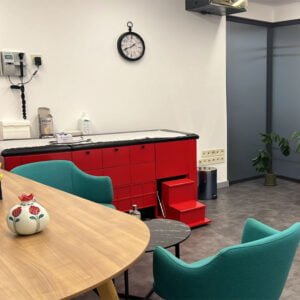This website uses cookies so that we can provide you with the best user experience possible. Cookie information is stored in your browser and performs functions such as recognising you when you return to our website and helping our team to understand which sections of the website you find most interesting and useful.
Eye Allergy Treatment
- Home
- Eye Allergy Treatment

All Inclusive Package Details
5 Star Accommodation
Transfer Services
Hospital
Expert Allergy Doctors
Why Should You Choose Us?
Founded in 2022, CURExplore is a service provider that brings together guests from abroad through medical staff and translators who can speak their own language.
CURExplore, which organizes international patients from all over the world, mostly from Europe to Turkey, is an Istanbul-based health tourism intermediary company that is a member of TURSAB (Association of Turkish Travel Agencies) with the code 14076 and has the Ministry of Health Accreditation.
30-minute free consultation.
After free online consultation, we determine your needs and plan your operation free of charge.
No Surprise Costs
We will not charge you any additional fees.
All Inclusive Packages
5-Star Accommodation, Transfer, Post-Operative Care at the Hotel, Translator, All Processes with You
Fill Out the Form and Get a Personalized Quote
Address
Küçükbakkalköy neighborhood. Merdivenköy Yolu neighborhood. No:12/1 Ataşehir / İstanbulContact Form
Frequently Asked Questions on Eye Allergy Treatment
Eye allergy is a type of hypersensitivity reaction of our eyes to certain elements in the environment, such as pollen, dust, pet dander or certain foods. This can cause unpleasant symptoms such as itching, redness, tearing and swelling of the eyes. Most of the time, eye allergy is seen as part of seasonal allergies that occur in spring, but some people can experience it at any time of the year. What is actually happening here is that our eye's immune system is reacting more than usual. Genetic factors can also play a role, so if you have a family history of allergies, you are more likely to have eye allergies.
When you experience eye allergies, the way your eyes react can sometimes affect your daily life and can be quite uncomfortable. Here are the most common symptoms you may experience:
Itchy Eyes: Perhaps the most familiar sensation is the constant itching of your eyes. Sometimes this itching can be really hard to resist.
Redness: The white part of your eye may become red due to its reaction to allergens.
Watering: Your eyes may water constantly, like a river, in response to allergic reactions.
Swelling And Inflammation Of The Eyelids: Your eyelids can swell and sometimes even become inflamed, making it difficult to open your eyes.
Burning Sensation: Your eyes may feel uncomfortable, such as burning or stinging.
Feeling Of Heaviness In The Eyes: You may feel a heaviness in your eyelids and tiredness, as if you are sleep deprived.
Sensitivity To Light: Bright lights can make your eyes even more uncomfortable during allergy periods.
Blurred Vision: Constant watering or swelling of your eyes can temporarily blur your vision.
Difficulty Using Contact Lenses: If you wear contact lenses, eye allergy can make it difficult to wear and feel comfortable with them.
Foreign Substance Sensation: You may feel like there is something in your eyes all the time, like a piece of dust or an eyelash is constantly in your eye.
If you are experiencing one or more of these symptoms, do not take it lightly. Consulting an ophthalmologist is the best step. These symptoms may vary depending on factors in your environment, the seasons and your personal allergy status. The important thing is to take the necessary steps to protect your eye health and lead a comfortable life.
Eye allergy is actually a sensitive reaction of our eyes to many things around us. So, what causes these allergic reactions? With the arrival of spring, pollen scattered by trees, grass and weeds prepares the ground for allergies for the eyes. What we call house dust is actually the home of tiny mites. These tiny creatures can hide in bedrooms and cause eye allergies.
The hair and skin rashes of your cat or dog can be irritating for your eyes. Mold, especially in humid environments, can irritate your eyes. Air pollution outside or cigarette smoke indoors is not very friendly for your eyes.
Some of the products you use when applying make-up can damage your eyes. If you wear contacts, your lenses or lens solution may irritate your eyes. Some eye drops or medicines you use can cause unexpected reactions. Outdoor chemicals, smoke and other pollutants can also cause eye allergies. If you have a family history of allergies, you may be slightly more likely to develop eye allergies. These causes can cause different reactions in everyone and sometimes more than one factor can combine to trigger eye allergies. If you are experiencing symptoms of eye allergies, we recommend that you consult an ophthalmologist to understand the underlying causes and determine the right treatment options.
To diagnose eye allergy, doctors usually assess your symptoms and examine your health history. Your doctor will ask when your allergy symptoms started, how long they last and how often they recur. He or she will also want to know if you have a family history of allergies. Careful examination of your eyes is important to confirm the symptoms of allergies. Your doctor will look for redness, swelling or other signs of an allergic reaction in your eyes.
Skin allergy tests can be performed to identify the specific substances that cause allergies. These tests are used to observe your skin's reaction to various allergens. In some cases, blood tests may be needed to diagnose allergic reactions. These tests check to see if the antibodies that cause allergies are present in your blood. Your doctor may want to confirm the diagnosis of eye allergy by using certain eye drops. These drops can help to relieve allergic reactions.
In rare cases, a sample of eye fluid may need to be taken for laboratory analysis. Through these tests and examinations, your doctor can determine the presence and type of eye allergy. Once diagnosed, he or she will advise on the most effective treatment methods. This process can vary from person to person because everyone's allergies and reactions are different. The important thing is to understand the underlying cause of your symptoms and find the most appropriate treatment.
Treatment of eye allergy is usually aimed at relieving symptoms and controlling allergic reactions. The most effective treatment for eye allergy is to avoid allergy-causing substances as much as possible. Avoiding allergens such as pollen, dust and pet dander reduces symptoms. To reduce itching and swelling in the eyes, making a cold water compress with a clean cloth helps relieve allergies.
Allergy medicines such as antihistamines and decongestants can relieve eye allergy symptoms. These medicines are available over the counter or by prescription. Eye drops containing antihistamines are effective in reducing itching and redness. Drops containing steroids can be used for more serious conditions, but should be taken with the advice of a doctor.
Oral allergy medicines can also help relieve eye allergy symptoms. Immunotherapy, also known as allergy shots, can help develop tolerance to allergies in the long term. This treatment is usually reserved for more serious allergy conditions.
Keeping your home clean regularly, using air purifiers and allergen filters can help reduce eye allergy symptoms. For people with eye allergies, contact lenses can cause discomfort. In this case, it may be helpful to reduce lens wear or switch to glasses.
Treatment for eye allergy varies from person to person. It is important to talk to an ophthalmologist to find the most appropriate treatment for the symptoms you are experiencing. Your doctor will recommend the most effective treatment methods for your specific case.



























